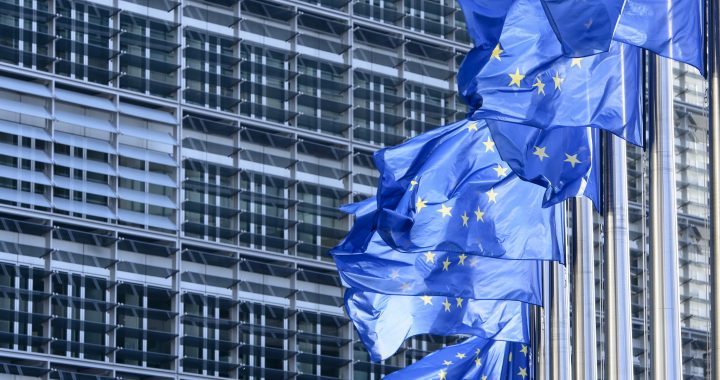

 "European Union headquarters in Brussels" (CC BY-ND 2.0) by Bankenverband - Bundesverband deutscher Banken.
"European Union headquarters in Brussels" (CC BY-ND 2.0) by Bankenverband - Bundesverband deutscher Banken.
A European Parliament committee signaled its approval to begin negotiations on Kosovo’s visa liberalization package, following the fulfillment of Brussels’ demands on crime, corruption and border demarcation.
The Civil Liberties, Justice and Home Affairs Committee of the European Parliament voted decisively on Thursday in favor of Kosovo being granted a visa-free regime with the European Union’s passport-free Schengen area.
The committee’s vote moves Kosovo another step forward towards its goal of visa liberalization.
Kosovo President Hashim Thaci hailed the committee vote as a step forward.
“We are increasingly approaching the final decision, long overdue, to remove every barrier to free movement for our citizens in the Schengen area,” Thaci wrote on Facebook.
The European Parliament committee previously rejected the proposal back in 2016, saying that without border demarcation with Montenegro and an improved track record in the fight against crime and corruption, Kosovo would not advance in the visa liberalization process.
The European Commission revived the proposal on visa liberalization in July, after the commissioner for migration, home affairs and citizenship, Dimitris Avramopoulos, said that both of these criteria had been fulfilled.
The standing committee, which is responsible for establishing and developing measures on common border management and freedom of movement within EU borders, backed the proposal to open negotiations between the EU Council, the Commission and the European Parliament on the Kosovo visa issue.
A waiver would give the green light for Kosovo citizens to travel visa-free in the Schengen zone for up to 90 days, consisting of the 26 member states of the Schengen Agreement, which excludes Britain and Ireland, but allows travel to four non-EU member states, Iceland, Liechtenstein, Norway and Switzerland.
Tanja Fajon, the European Parliament rapporteur appointed to deal with the Kosovo visa liberalization issue, said that visa-free travel would end Kosovo citizens’ sense of isolation.
I am happy @EP_Justice just adopted the decision to enter into negotiations with the @EUCouncil on #visa liberalisation for#Kosovo citizens. This is an important step to bring #Kosovo closer to Europe and to break the isolation. Well done and congratulations! @TheProgressives pic.twitter.com/Hp3ox2jgNs
— Tanja Fajon, mag. (@tfajon) August 30, 2018
“The conditions to be met by Kosovo were set very high, significantly higher than for other Balkan countries and they have all been fulfilled, as officially confirmed by the European Commission, including the fight against corruption and organized crime,” Fajon added.
Kosovo’s Minister of European Integration, Dhurata Hoxha, said that it was time Kosovo was rewarded for the work done on meeting the set criteria.
“The wellbeing of our citizens is and should always be our priority. Our citizens deserve free movement,” Hoxha said in a press release.
The European Parliament’s rapporteur for Kosovo, Igor Soltes, hailed the vote as a big step towards freedom of movement but cautioned that there were more stages in the process to come.
“First, the mandate must be confirmed at the plenary session by the European Parliament and I expect this to be done swiftly. The crucial vote will be in the [European] Council,” he said. “I sincerely hope member states will follow the example of European Parliament and European Commission.”
According to a report published by the Balkans Policy Research Group, BPRG, the proposal will be discussed and revised by the Visa Working Group of the EU Council following its affirmation at a European Parliament plenary session, as well as by the Working Party on the Western Balkans Region, COWEB. After consent from both groups, it moves to the Committee of Permanent Representatives, COREPER.
The EU Council will then adopt its negotiation position for the inter-institutional negotiations. Before the negotiations formally take place, COREPER must affirm that there is a broad consensus within the committee to advance towards negotiations, after which they will open and the EU Council, the European Parliament and the European Commission will decide on a package for visa liberalization that works for all three institutions.
30 August 2018 - 14:58

Resuming its 2016 proposal for a visa-free regime, during a press conf...

The Kosovar and Serbian Presidents met with High Representative Mogher...

If the European Commission affirms its proposal to give Kosovo visa li...

The draft statute of the Association of Serbian Municipalities, one of...

Djuric’s flippant statement about how he, like all Serbs, can travel...